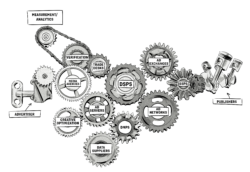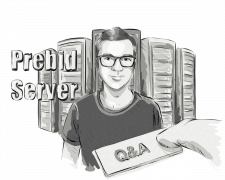Whether your goal is to create a high-performance platform to facilitate the buying and selling of digital media, report on the performance of campaigns, or create audiences using data from various sources, finding a company that’s capable of developing advertising and marketing software can be a formidable challenge, considering the precise skills, domain knowledge and experience required to build this type of technology.
That’s where Clearcode comes in.
As a specialized software development company focused on AdTech and MarTech solutions, we bring to the table a dedicated team equipped with the necessary skills, insights, and experience.
Our goal is not just to provide you with the technical resources but to be a reliable partner in navigating the complexities of software development for advertising and marketing.
We understand the hurdles you face, and our team is here to provide stability, specialized skills, and support throughout the process.
Learn more about us, our approach, and the companies we work with by checking out our latest video:
Below is the transcript from the video interview above.
Michael Sweeney: Hello everyone, my name is Michael Sweeney and I’m Head of Marketing here at Clearcode. And in today’s video, I’m joined by my colleague and good friend Radek.
Radosław Kostecki: Thanks for having me, Mike.
Michael Sweeney: No problem at all, and Radek is Head of Business Development here. So Radek, just to start things off, just tell us a little bit about yourself and what you do here at Clearcode.
Radosław Kostecki: Sure. So yeah, Radosław, Head of Business Development, everyone calls me Rado. I’m responsible for managing the whole pipeline at Clearcode, so also talking with different potential customers, making sure that we’re in line, and we are finding the opportunities, and talking with different companies in the industry about AdTech development.
Which types of companies does Clearcode work with?
Radosław Kostecki: So essentially, mainly, these are not only the typical AdTech & MarTech vendors, like the companies that already have some existing stock, either a DSP, SSP, or any other system and we help them with our development expertise, but also publishers, big publishers especially, media agencies.
Also the non-typical verticals like retail media is quite common nowadays, and telco industry, even banking companies are looking more and more towards even marketing technology, so the range is quite wide.
The only thing is which is common is the AdTech&MarTech, this is what we specialise in, what we do.
What industries do our clients come from?
Radosław Kostecki: I’d say that all the companies that either want to join the AdTech world because they’re obviously some companies that are already on the market for many years, however there are companies with potential to become an AdTech company in some sense.
For example, telecommunication industry, retail media, which is very, nowadays, common, many companies are trying to get use of the first party data or monetize what they have at the moment, either the inventory ad spaces that they can also fulfil.
And if the scale is huge enough, big enough, it’s definitely a use case to actually build, have their own IP, own system that they can leverage.
Michael Sweeney: Yeah, definitely. And I guess going back 5 years ago when we looked at the types of companies that we’d work with and the industries they represent, I guess a lot of that it’s changed quite a bit, right.
It’s, kind of, moved with the times, as you said before there’s a lot happening with retail media, streaming, telcos as well.
So do you notice that change as well, that we’re, kind of, moving with the industry, I guess, and everything that’s happening there?
Radosław Kostecki: Yeah, you know, Mike, I think that one of the main changes in the industry is obviously the cookieless future and this also creates an opportunity for others to either have their own systems or create other workarounds apart from the cookies that were the base of the industry.
But still, there’s a lot of potential in terms of the company that thinks about their own IP and even the telco industry nowadays, like in the European market, they thought about the unified identification, for example, of the users.
And this creates a lot of demand for technology, for advertising technology especially, due to the fact that many of them are using or have a very complex ecosystem already in place and in order to, like, properly add the system into the existing part.
It can be a challenge using the 3rd party providers, and then there’s a lot of potential to actually create a new piece of the stack.
What problems do we help our clients solve?
Radosław Kostecki: So as I told you about the 3rd party providers, there’s, like, a lot of 3rd party white label or 3rd party providers that they charge you for the traffic or depending on the traffic you just get, like, a monthly fee, or a yearly fee.
And if the scale is big enough, there’s actually a use case to think about to cut the middleman and have the actual technologies their own, and the only thing to take into account then is just the development cost, infrastructure cost, either AWS, Azure, GCP, or whatever cloud provider is required.
This might be also an investment that they can save in the long run, to save actually the money.
The other part is the actual ownership and privacy concerns when you use the 3rd party provider. You actually need to share the data with the 3rd party provider, which for many companies, especially that cares about the 1st party data that they own, they cover, there’s like a pushback to actually use the white label provider.
And yeah, so those type of conversations are quite often the beginning of the journey when we talk with the customers, when there’s like a build versus buy, and when there’s, like, a build use case, Clearcode actually can help and navigate how to actually develop the system.
Why do companies decide to build custom software vs renting or buying existing AdTech platforms?
Radosław Kostecki: The acquisition part is very interesting and the whole AdTech market is a very dynamic space, so as we’ve seen last time even AT&T acquisition, or AppNexus transforming into Xandr, got acquired by Microsoft.
Those changes are constant in the AdTech industry and if someone decides to acquire the system, on the one side okay, this is an existing system with integration already in place, with even sometimes business relationship with the potential customers, on the other hand technologically how to actually adjust the acquired system to the ecosystem that is already in place, this is a challenge for many companies.
This is, like, challenging due to the actually work that needs to be done anyway. It can eventually, in the long run, even create much more problems and much more challenges related to customization and even rewriting some parts of the system to make sure that the scale is handled properly.
This is one of the reasons that someone even if thought about acquisition 1st, decides, in the long run, to actually build, yeah.
Michael Sweeney: Yeah, definitely. I noticed that you’ve touched on this a second ago as well, about the telcos with AppNexus being acquired by AT&T a few years ago.
And there are many examples of telcos that acquired, you know, AdTech companies, and then tried to, kind of, implement them into their existing business to, you know, grow, to build an advertising business, essentially.
But a lot of those acquisitions didn’t work out and as we saw, a lot of those telcos ended up selling that AdTech company, or that platform, often at a loss.
I guess the whole telco situation with AdTech is quite an interesting one, because especially when you look at how some other companies these days are getting into advertising, right, it’s a very different situation, they’re taking a different path with it.
Because with telcos, a lot of them went down the acquisition path, whereas companies like Uber, you know, some of the other super apps, Instacart, DoorDash, etc., a lot of those are building the software in-house themselves, right.
So they’re not going down the acquisition path, they’re focusing on the actual building part and it’ll be interesting to see how that works out because with the acquisition path, as you said, there’s a lot of risk, I guess, especially if, you know, not only the technical risk which you said as well, which is can be quite hard to overcome, a lot of technical challenges with that, but also in the business side as well.
You’re spending hundreds of millions of dollars on something, you know, you’ve really got to make sure you’ve got a proper plan in place.
And the question is whether you’re actually wanting just the tech, or the existing business as well, right, because companies like AppNexus were existing, huge businesses, right, they were generating revenue.
So yeah, it’s quite interesting to see what happened with the telco situation with AdTech and obviously how it’s different with a lot of other companies as well.
Radosław Kostecki: Indeed, Mike. I think that even the conversations, ongoing conversations, that we have, not only the customers from the industry, but also the customers, potential leads that thought about building the systems, when you look at their ecosystems, what they’re struggling with, even the legacy systems or they have such complexity that is challenging for them to actually narrow, even on the business level, narrow properly the strategy.
And Clearcode not only develops the system, which is the end goal, but obviously also the strategy is crucial to make sure that this is in line with what the company wants.
Obviously the business details are the ones that the customer has the biggest input on, but we can always address, based on our past experiences, also givethe value added.
Those conversations are very interesting and this is definitely a trend in the industry, that the telco industry, eventually, many of those companies will become an AdTech vendor, in fact in.
As for the super apps like Uber, DoorDash, any others, those have just an upper hand of the
data itself, so it’s quite a no-brainer to them to actually decide to build their own systems.
Why do companies choose us vs hiring developers internally or using body-leasing companies?
Radosław Kostecki: Sure, for sure in terms of building the advertising systems, expertise is important.
Because Clearcode throughout the 14 years of our history building those systems, we’ve come up with different use cases, very specific, complex systems that had to cover like high scalability, either the system had many integrations in place that we had to also develop and create.
I’d say the more complex project gets, the more Clearcode might be a better fit, because someone takes responsibility to actually develop the system, or the stakeholders from the company actually need to make sure that this would be a success, many of the companies tried to do it internally first, then came back to us, because they actually failed with the with the initiative.
It’s not always something that we say, that for all of the projects it needs to be
Clearcode in the first place, we’re always open for different approaches, but obviously the more project requires high scalability, high QPS, the traffic will be huge, those are not like a simple platforms to develop, like it requires just a lot of experience.
So this is the upper hand we give, time to market should be as quick as possible for the MVP to be live.
Michael Sweeney: Yeah, definitely. And I think, you know, as you said experience, expertise, skills in this area, it’s quite important, right, because as you said before, the more complex the platform is, the more experience you need to have building it, right.
And I guess even with, you know, platforms, like common platforms, like DSPs, even though they are very common platform within the industry used by, you know, there’s, like, hundreds, possibly even thousands of vendors on the market.
When it actually comes to building it is still a quite a complex thing to build, right, because you’ve got to integrate with the open RTB protocol, you’ve got to understand what a bid request is, you’ve got to understand how long you’ve got to respond to a bid request as a DSP, or bidder.
It can be very hard for, I guess, you know, you’re even a seasoned, experienced software developer who has no experience in AdTech actually building it, right.
So if I don’t know what a DSP is, they’re going to have no chance of building it, right, because they have to learn all the, you know, the inside things about how it all works and stuff.
Radosław Kostecki: Funny thing in terms of AdTech is that we have a lot of 3 letter acronyms, a lot of shortcuts DSP, SSP, CDP.
Even when we talk initially with our customers, sometimes they say OK, I want to build a DSP, but if we dive into details, deeper requirements and find out that not necessarily this is the actual end system that needs to be developed.
So a lot of terms, the domain is also quite huge in terms of the potential systems that can be developed, so we always like try to navigate customers in the discovery to make sure that it’s in line with what they’re expecting.
Michael Sweeney: Excellent, perfect. So yeah, that’s all of the questions I had for today Radek, so thanks so much for joining me today and sharing your insights.
If you’d like to learn more about custom AdTech&MarTech development, if you have any questions at all, feel free to get in contact with us via our website clearcode.cc.
You can also get in contact with Radosław Kostecki on Linkedin, he’s very active on Linkedin, so he’ll probably reply to your Linkedin message before he replies to an SMS, so check out Radosław Kostecki and get in contact with him as well and we’ll see you next time.
The post The Companies Clearcode Works With: Q&A with Radosław Kostecki appeared first on Clearcode.
The original post is at AdTech Archives – Clearcode




Leave a Reply